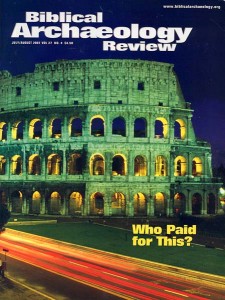Biblical Archaeology Review, July/August 2001
Features
Financing the Colosseum
Where did the money come from to build this magnificent Roman structure? An extremely unusual inscription—one without any extant letters—points to the spoils from the Jerusalem Temple.
“So long as the Colosseum stands, Rome also stands; when the Colosseum will fall, Rome also will fall; when Rome will fall, the world also will fall” (The Venerable Bede).1 The Colosseum is the most striking evidence of the grandeur of ancient Rome—its most...Read more ›
Surprises at Yattir: Unexpected Evidence of Early Christianity
Archaeology is full of surprises. Sometimes we don’t find what we had expected to find. Or we find something we never expected to find. Either way, the experience is always exciting—and wonderful. A good case in point is our excavation at Khirbet Yattir (khirbet...Read more ›
The Yattir Mosaic: A Visual Journey to Christ
Once the Yattir excavation team got over the surprise of finding a magnificent sixth-century C.E. church on the site’s southern spur, where we were looking for much simpler, earlier remains, we began to think about how to interpret the many complex symbols embedded in the mosaic floor...Read more ›
King Hezekiah’s Seal Revisited
Small object reflects big geopolitics
Some two years ago, Harvard professor Frank Moore Cross published an article in BAR that described for the first time an extraordinary lump of clay.a Known as a bulla, the clay was impressed with a seal belonging to King Hezekiah, who ruled Judah from c. 727–698 B.C.E...Read more ›

